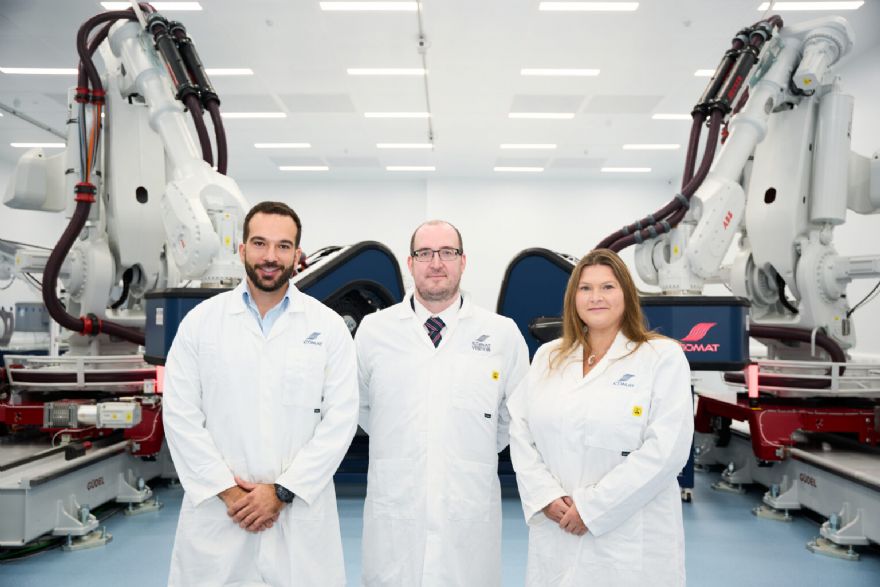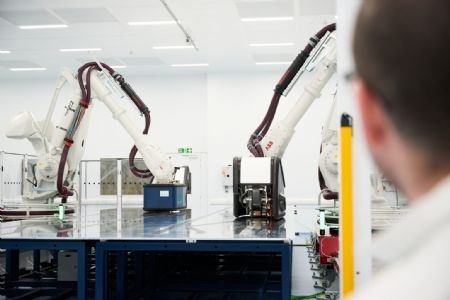 Pictured left to right: Dr Evangelos Zympeloudis, CEO and founder of iCOMAT, Matt Archer, director of launch and ISAM at the UK Space Agency, and Antonia Yendell, head of space ecosystem development at the UK Space Agency. Credit: iCOMAT
Pictured left to right: Dr Evangelos Zympeloudis, CEO and founder of iCOMAT, Matt Archer, director of launch and ISAM at the UK Space Agency, and Antonia Yendell, head of space ecosystem development at the UK Space Agency. Credit: iCOMATA major step forward for the UK’s space industry was marked last week with the official opening of a pioneering manufacturing facility in Hardwicke, Gloucester. The Advanced Composites Manufacturing Enterprise (ACMA), spearheaded by iCOMAT — a University of Bristol spin-out — has ‘launched’ operations at its new 45,000ft
2 site, promising to create 2,000 jobs and revolutionise the way spacecraft are built.
Backed by £4.8 million from the UK Space Agency’s Space Clusters Infrastructure Fund (SCIF), the facility is set to become a cornerstone of Britain’s space manufacturing capabilities. The launch event drew key figures from the UK Space Agency, European Space Agency, and leading industry players including Orbex, Lockheed Martin, and Thales Alenia Space. Guests were given guided tours of the fully automated factory floor and witnessed live demonstrations of iCOMAT’s patented Rapid Tow Shearing (RTS) technology.
Space Minister Liz Lloyd hailed the opening as a triumph for British innovation. She said: “The opening of this manufacturing facility is a win for British ingenuity and testament to our commitment to backing our homegrown space sector. The innovative technology developed here will support everything from our thriving satellite industry to future deep-space missions.”

Dr Evangelos Zympeloudis, CEO and founder of iCOMAT, expressed his gratitude for the support that made the creation of the facility possible. He said: “We are immensely grateful for the investment from the
UK Space Agency, which has been pivotal in establishing this world-class facility. By leveraging our expertise in advanced materials, we are creating opportunities for the space industry to develop more efficient, sustainable vehicles, while creating a domestic supply chain and strengthening the UK’s competitive position in the global market. Our team is excited to be fully operational, engaging with the UK space industry and beyond, driven by iCOMAT’s unique patented technology.”
The ACMA facility is designed to meet the growing demand for lightweight, cost-effective components in space applications. Its RTS technology enables the production of composite structures that are significantly lighter than those made using conventional methods — an essential advancement for satellite and spacecraft design.
Specialised production linesConstruction of the facility began in 2023, with a total investment of £8.2 million, including £3.3 million in match-funding. iCOMAT also benefitted from over £800,000 through the UK Space Agency’s participation in the
European Space Agency’s General Support Technology Programme (GSTP). The ACMA cluster includes two specialised production lines — the 2D-RTS line is tailored for flat structures and complex shapes such as satellite panels and solar array substrates, while the 3D-RTS line, is engineered for geometrically complex components like satellite and upper stage propellant tanks, using advanced fibre steering on doubly curved surfaces.
Matt Archer, UK Space Agency’s director of Launch, highlighted the facility’s versatility and accessibility. Operating on a manufacturing access basis, the site allows customers to engage with RTS technology in various ways — from retrofitting existing designs to integrating it into new vehicle concepts.
While the facility’s primary focus is space, its advanced capabilities also extend to aerospace and automotive sectors, showcasing the broad potential of RTS technology. The launch of iCOMAT’s new site not only strengthens the UK’s domestic supply chain but also positions the country to capture a larger share of the global space economy.